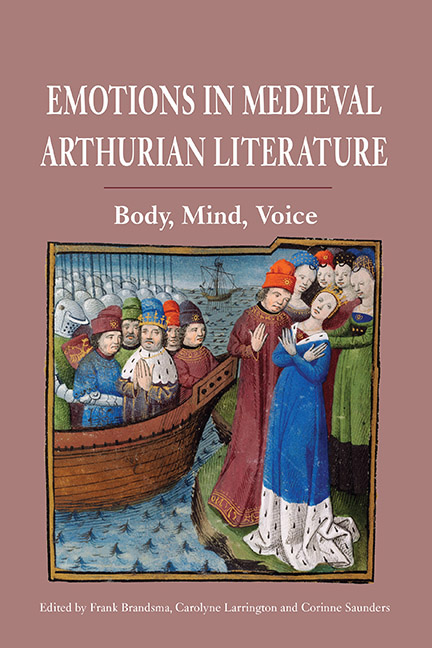3 - ‘What cheer?’ Emotion and Action in the Arthurian World
Published online by Cambridge University Press: 21 May 2021
Summary
I
Although the history of emotions is at present a boom area in humanities research, not least in medieval and early modern studies, the current widespread interest in emotions has not been led by the humanities. In the field of psychology, for instance, emotions, once regarded as a distraction from sound rational function, have been seen as vital to mental wellbeing for a good while now. Outside academia, from primary education to the commercial workplace, the terms ‘emotional intelligence’ and ‘emotional literacy’ are commonly used. In that context, the emphasis is primarily instrumental and goal-oriented. To quote a popular source, emotional literacy is
the ability to express emotions productively. To be emotionally literate is to be able to handle emotions in a way that improves your personal power and improves the quality of life around you. Emotional literacy improves relationships, creates loving possibilities between people, makes co-operative work possible, and facilitates the feeling of community.
To me, this formulation of the role of the emotions in life is problematic. It seems full of kind assumptions about the benign social tendencies of empowered individuals. It champions the ‘quality of life’ yet is apparently mainly driven by an unexamined desire for productive labour in whose service both individual ‘emotional expression’ and ‘the feeling of community’ are enlisted. It does not favour a potentially dissenting or adversarial emotional reading, one which might question its implied construction of the common good or the reality of the community it wants people to internalise as their own. It does not ask in whose interests all this labour might be required. But if one considers the firm relation of individual emotions to a collective aim, the cultivation of a feeling of community, the linking of collectivity with a higher quality of life, the enabling of love and, especially, the relation of emotion to productive action, one answer to that question within medieval literary culture could be ‘in King Arthur's interests’. Arthur's reign, Camelot and the fellowship of the Round Table might be read retrospectively (if rather reductively) in these popular contemporary terms as a project to mobilise workplace emotions in the interests of the company owner.
- Type
- Chapter
- Information
- Emotions in Medieval Arthurian LiteratureBody, Mind, Voice, pp. 47 - 64Publisher: Boydell & BrewerPrint publication year: 2015
- 2
- Cited by

